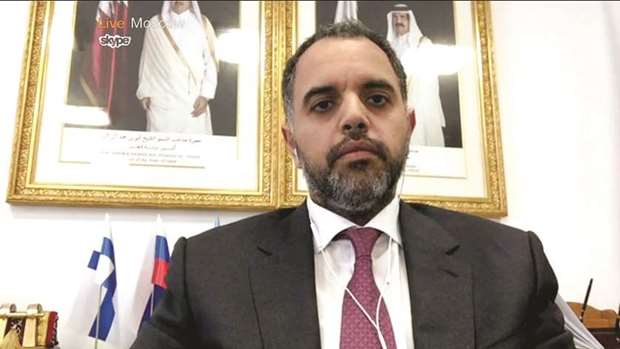My country, Qatar, is a nation under siege. For the past month, its borders and airline routes have been closed off by a regional bloc consisting of Saudi Arabia, the United Arab Emirates, Bahrain and Egypt.
The authorities in the neighboring Gulf states have forced the repatriation of Qatari citizens, regardless of age and health.
The bloc has issued a list of wild accusations against Qatar.
They include the hosting of Iran’s Revolutionary Guard Corps in our capital, Doha; the funding of the pro-Iranian Lebanese militia organization Hezbollah; and support for the Islamic State terrorist group.
This hardly makes sense since Hezbollah and the Islamic State are sworn enemies, at war with each other in Syria.
Other claims are equally spurious. Qatar stands accused of supporting the Houthi rebels in Yemen. Yet, until this blockade started, my country participated in the Saudi-led coalition in Yemen and lost soldiers fighting the Houthi rebels. This accusation is an insult to their memory.
The Gulf bloc also came up with a list of purported terrorist groups and individuals whom Qatar supposedly hosts or sponsors.
One of them is, in fact, a Yemeni Salafist leader who lives in Riyadh, the Saudi capital.
Others named do not live in Qatar and have no connection to Doha.
Just as in 1914, when the Austro-Hungarian government came up with a list of impossible and unjustifiable demands as a pretext to attack Serbia, so Saudi Arabia, the UAE, Egypt and Bahrain have given my country a demeaning and insulting list of conditions to be met to get this unwarranted siege lifted.
Qatar received no previous notice of these demands.
Despite our membership in the Gulf Cooperation Council, we were never even asked to discuss them.
With the expiry of the bloc’s ultimatum, the Saudi alliance is threatening additional sanctions.
Thousands of Qatari citizens have been affected.
My own mother was making the pilgrimage in Makkah, Saudi Arabia, when the blockade began; she was forced to return to Doha in a humiliating, inconvenient way.
Given the kingdom’s claim to protect Islam’s holy sites and the visitors to them, this exclusion of pilgrims is an offense to the Islamic world.
Among the conditions the bloc is attempting to impose on Qatar is that we close down a number of Qatari news organizations, including the award-winning satellite channel Al Jazeera, as well as other London-based outlets.
Qatar’s stand is clear: We support the freedom of the press — these outlets have been free to publish content critical of Qatar itself, including about this blockade — and the bloc’s demand that these outlets be closed is unacceptable.
Al Jazeera has achieved international recognition for its reporting in the Middle East, where most other media groups are either slavishly pro-regime or heavily censored.
During the Arab Spring, media outlets in the bloc countries typically showed serene and peaceful scenes in cities where, in reality, demonstrators were being mowed down by security forces.
These countries operated a virtual news blackout against their pro-democracy movements; now they cannot forgive us because their citizens could tune in to Al Jazeera and know the truth.
Today, the talk shows and social media platforms of the state-supported media in Egypt, Saudi Arabia and the Emirates do their masters’ bidding and call for regime change in Qatar. Some talk-show hosts and their guests have even called for terrorists attacks on Qatari soil. Senior Qatari officials have been subjected to character assassinations and insults.
In Saudi Arabia and the Emirates, dissent has been criminalized, and anyone speaking up online for Qatar faces prosecution and up to 15 years in prison.
This campaign has been orchestrated from the top. A Saudi state minister and media adviser to the new crown prince, Mohammed bin Salman, said on Twitter that he hoped the Qataris “don’t accept” the demands, and “we’ve only just begun.”
Deliberately escalating the tension into an implied threat against our very sovereignty, the Dubai deputy chief of police and general security tweeted, “Qatar has always been a part of the UAE that cannot be taken from it.”
Let’s be clear: Qatar is being punished because conservative actors in the bloc, emboldened by changes in the geopolitical balance in the region, see an opportunity to show people in the Arab world that if you dare to dream of change, the autocratic regimes will mow you down.
But Qatar will not back down from this unprovoked attack.
Qatar is a sovereign state proud to be at the forefront of development in the Arab world.
It embraces change, encourages debate and supports those who need help, whatever their ethnic or religious background.
When the Arab Spring came, it did not do so for one religion or sect but for all citizens in the region.
Besides Qatar’s participation in the Saudi-led coalition in Yemen, we are also an active member of the American-led multinational alliance against terrorism. United States Air Force strikes against the Islamic State in Syria, and against terrorist groups in Afghanistan, take off from Al Udeid Air Base.
Qatar is a key logistics hub in the international fight against terrorism, and we have given it major financial and political support.
We take satisfaction in this record. In contrast to many regimes in the region, Qatar has championed American values, including constitutional government, freedom of speech and human rights.
The Trump administration should advise its Gulf allies to change course. If the United States continues to stand by and acquiesce to the bloc’s hostile action against Qatar, which can drag our region only deeper into division and instability, American interests in the Middle East will be imperiled.
*Fahad bin Mohamed al-Attiya is Qatar’s ambassador to Russia.

Fahad bin Mohamed al-Attiya


